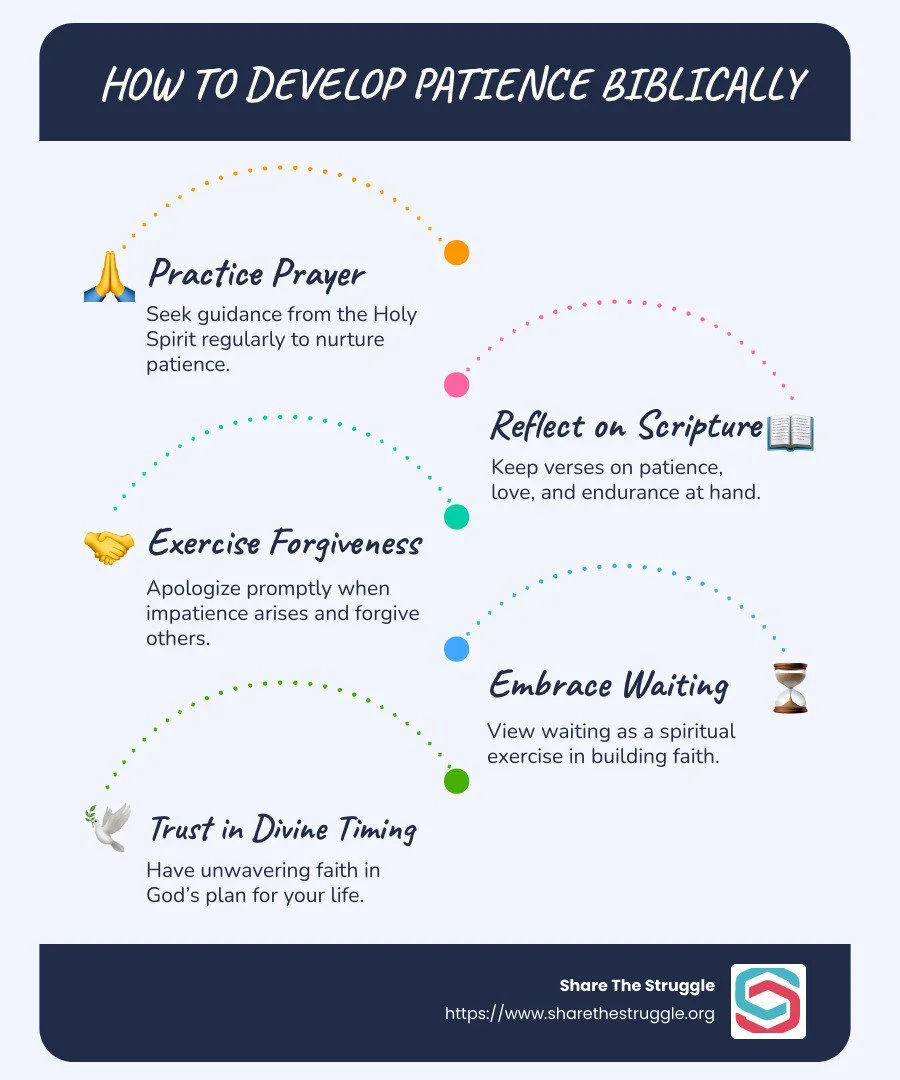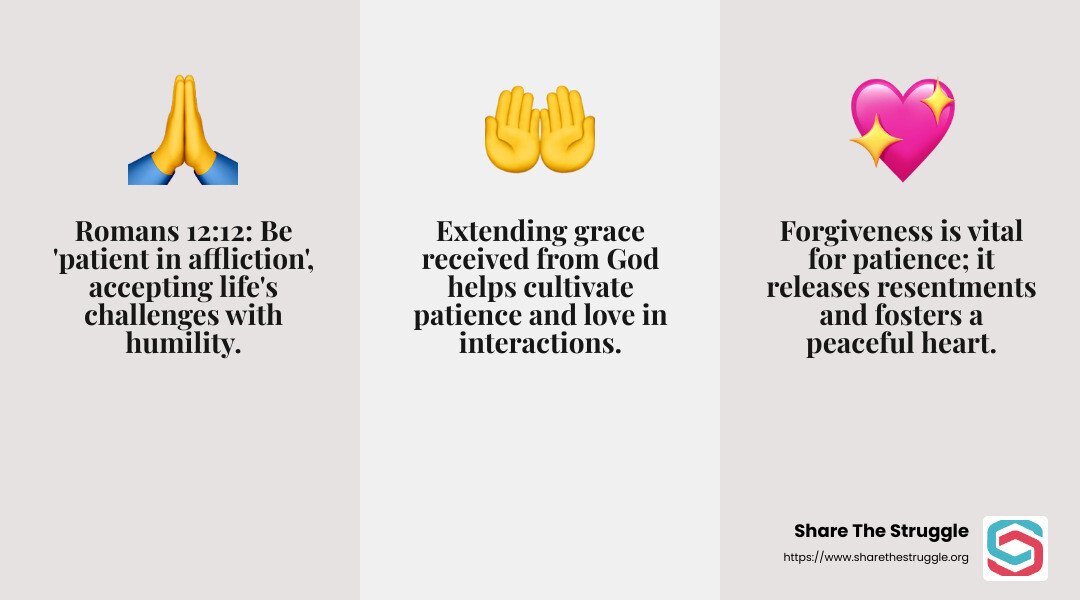Practicing Patience: A Biblical Approach
How to develop patience biblically is a journey that intertwines faith, spiritual growth, and practical steps. Here's a quick overview to get you started:
Practice Prayer: Regularly seek the Holy Spirit’s guidance for patience.
Reflect on Scripture: Keep verses on patience, love, and endurance at hand.
Exercise Forgiveness: Apologize promptly when impatience arises.
Accept Waiting: Learn to view waiting as a spiritual exercise in faith.
Trust in Divine Timing: Believe in God’s plan for your life with unwavering faith.
In today’s world, cultivating patience is both a challenge and an opportunity for growth. Patience is more than just enduring delays and hardships; it's a deep-seated virtue rooted in faith and characterized by the gentle persistence woven into our spiritual fabric. This biblical patience — an “unyielding, defiant perseverance” — offers believers a pathway to strength and tranquility in times of trial.
Through the teachings of Romans 5 and James 1, we see patience as more than a passive trait. It’s an active, courageous stand against trials, urging us to develop endurance, which in turn fosters a solid character and a hopeful future. Embracing this form of patience enables believers to bear hardships gracefully, confident in God’s purpose and timing.
To steer this path, Share The Struggle offers coaching services designed to integrate faith with emotional and mental support. Engaging in personalized coaching can help you deepen your spiritual practice and cultivate patience in everyday life. Find how these guiding principles can transform your journey as you connect with our expert coaches.
Understanding Biblical Patience
Patience is often seen as a simple act of waiting, but biblical patience carries a deeper, more profound meaning. It is not just about enduring delays or setbacks. Instead, it's a spiritual discipline, deeply rooted in faith and love, that enables us to face life's challenges with grace and strength.
The Role of Faith in Patience
Faith and patience go hand in hand. Hebrews 6:12 reminds us that through faith and patience, we inherit God’s promises. This means that patience is not a passive waiting but an active faith-filled journey. Faith fuels patience, allowing us to trust in God's timing and promises, even when the path is unclear.
In contrast, Stoicism—a philosophy that emphasizes emotional detachment and endurance—offers a different view of patience. While Stoicism encourages enduring hardships without complaint, biblical patience is about enduring with hope and trust in God’s plan. It is a patience that is active, not passive, and is deeply connected to our relationship with God.
Examples of Patience in the Bible
The Bible offers numerous examples of patience that illustrate the strength and faith required to endure life's trials.
Job is a classic example. Despite losing everything, he remained faithful, trusting in God’s wisdom. His story teaches us that patience is not about understanding why trials happen but trusting that God is with us through them.
Jesus exemplified ultimate patience. During His ministry, He faced rejection, betrayal, and suffering, yet remained patient and loving. His patience was rooted in His divine purpose and love for humanity.
James 1:3-4 highlights the process of developing patience: "The testing of your faith produces patience." This passage encourages us to view trials as opportunities to grow in patience and faith.
Finally, Psalm 40:1 reflects a patient heart: "I waited patiently for the Lord; he turned to me and heard my cry." This verse reminds us that patience involves waiting on God with trust and hope.
Through these examples, we see that patience is a vital part of spiritual growth. It requires faith, endurance, and a steadfast hope in God's promises.
To cultivate this form of patience, consider engaging with Share The Struggle's faith-based coaching services. Our expert coaches can guide you in integrating biblical principles into your daily life, helping you grow in patience and faith.
How to Develop Patience Biblically
Developing patience from a biblical perspective involves embracing certain spiritual practices. These practices include accepting discomfort, practicing forgiveness, extending grace, and focusing more on God than on others. Let's explore each of these steps to develop patience skills.
Accept Discomfort
The first step is acceptance. Romans 12:12 encourages us to be "patient in affliction." This means recognizing that life will have its challenges, and instead of resisting them, we should accept them with humility. Accepting discomfort requires us to surrender our complaints and unrealistic expectations. As we learn to accept what God allows in our lives, we become more patient.
Practice the Discipline of Forgiveness
Forgiveness is crucial for cultivating patience. 1 Timothy 1:16 speaks of Christ's "unlimited patience." This limitless patience is rooted in forgiveness. When we hold onto past grievances, impatience festers. By forgiving others, we release the burdens of resentment and allow patience to flourish. Forgiveness is a discipline that requires constant practice, but it leads to a more patient and peaceful heart.
Extend the Same Grace You Received from God
Grace is another key component. Proverbs 19:11 tells us that "a person's wisdom yields patience; it is to one’s glory to overlook an offense." When we remember the grace God has extended to us, we find it easier to extend that same grace to others. This perspective helps us respond with love rather than impatience, fostering a more harmonious relationship with those around us.
Think About God More and People Less
Finally, shifting our focus from people to God can significantly improve our patience. Revelation 1:9 highlights the importance of keeping our eyes on God. When we prioritize our love for God over the opinions or actions of others, we are less likely to be swayed by impatience. This focus not only strengthens our relationship with God but also helps us respond to life's challenges with a calm and patient heart.
By integrating these practices into daily life, you can develop a patience that is both biblically grounded and spiritually enriching. If you're looking to deepen your understanding and application of these principles, consider joining Share The Struggle's coaching sessions. Our coaches are here to help you steer your journey with faith and patience, offering both group and individual sessions custom to your needs.
Practical Steps to Cultivate Patience
Developing patience is a journey that involves practical steps. Here are some ways to cultivate patience in your daily life:
Practice Mindfulness
Mindfulness is about being fully present in the moment without judgment. It helps you gain control over your thoughts and reactions. When you practice mindfulness, you become more aware of your emotions and can choose how to respond rather than reacting impulsively.
Focus on the Present: Instead of worrying about the future or dwelling on the past, bring your attention to the here and now. This can be as simple as taking a few deep breaths and noticing your surroundings.
Non-Judgmental Awareness: Accept your thoughts and feelings without labeling them as good or bad. This acceptance reduces stress and improves patience.
Mindfulness Exercises: Engage in activities like meditation or deep breathing. These practices can help anchor you in the present moment, reducing anxiety and impatience.
Build Your Tolerance for Discomfort
Tolerance for discomfort is essential for endurance. Life is full of challenges, and learning to endure them patiently is crucial.
Accept Discomfort: Recognize that discomfort is a part of life. Romans 12:12 encourages us to be "patient in affliction." By accepting discomfort, you build resilience.
Endurance Training: Like physical endurance, mental endurance grows with practice. Start with small challenges and gradually tackle bigger ones, building your patience muscle over time.
Accept Challenges: View obstacles as opportunities to grow. This mindset shift can transform your approach to adversity, making you more patient and persistent.
Listen Well and Empathize
Listening and empathy are vital for patience in relationships. By understanding others, we can respond with kindness and patience.
Active Listening: Pay full attention when others speak. Avoid interrupting or planning your response while they're talking. This practice shows respect and builds patience.
Empathy: Try to see things from the other person's perspective. 1 Peter 3:8 calls for empathy, urging us to "be sympathetic, love one another, be compassionate and humble."
Patience in Relationships: Patience is crucial for healthy relationships. By practicing empathy and active listening, you create a supportive environment where patience can thrive.
These practical steps can help you cultivate patience in your life. If you need guidance on this journey, consider joining Share The Struggle's coaching sessions. Our coaches are ready to support you with personalized strategies and insights to improve your patience and overall well-being.
Frequently Asked Questions about Developing Patience Biblically
What does the Bible say about developing patience?
The Bible highlights the importance of patience in many passages. In James 1:3-4, it says, "the testing of your faith produces patience." This means that trials and challenges are opportunities to grow in patience. When you face difficulties, your endurance is strengthened, and you become more complete and mature in faith.
Romans 5:3 also emphasizes that tribulations lead to perseverance, which in turn builds character and hope. These verses show that patience is not just about waiting; it's about growing stronger and more faithful through life's trials.
How did Jesus practice patience?
Jesus is the ultimate example of patience. Throughout His life, He demonstrated patience in the face of adversity and misunderstanding. His journey to the cross is a profound example of patience and endurance. Despite being misunderstood and mistreated, Jesus remained focused on His mission of redemption and fulfilling God's perfect will.
In 1 Timothy 1:16, Paul talks about Jesus' "unlimited patience" as an example for believers. Jesus' patience was rooted in His love for humanity and His unwavering commitment to God's plan. His life teaches us that patience is not passive but an active choice to trust in God's timing and purpose.
How do you develop patience skills?
Developing patience skills involves several key practices:
Mindfulness: Being present in the moment helps you control your reactions. This can prevent impulsive responses and foster patience.
Control: Learning to control your thoughts and emotions is crucial. This involves recognizing when you're becoming impatient and choosing a different response.
Discomfort Tolerance: Building endurance by accepting discomfort is essential. Life's challenges are opportunities to practice patience and grow stronger.
Empathy: Understanding others' perspectives can help you respond with kindness and patience. Proverbs 19:11 says, "A person’s wisdom yields patience." By being empathetic, you demonstrate wisdom and grace.
Developing patience is a journey that benefits from support and guidance. At Share The Struggle, our coaching sessions can provide personalized strategies to help you cultivate patience in your life. Whether you're dealing with daily frustrations or significant challenges, our coaches are here to support you on your path to greater patience and well-being.
Conclusion
At Share The Struggle, we understand that developing patience is a vital part of emotional and mental health. Our faith-based approach offers a unique perspective on how to cultivate patience biblically. We believe that patience is not just about waiting; it's about actively trusting in God's timing and embracing the journey of growth.
Our captive thoughts coaching model is designed to help you take control of your thoughts and align them with Christ's teachings. This model empowers you to transform negative thought patterns and cultivate a mindset of love, forgiveness, and patience. By focusing on biblical principles, we help you develop the skills needed to face life's challenges with grace and resilience.
We offer a range of coaching options to support you on this journey. Whether you prefer group sessions or one-on-one coaching, our experienced coaches are here to guide you every step of the way. Our sessions are designed to provide practical strategies custom to your unique needs, ensuring you have the tools to practice patience in your daily life.
If you're ready to accept a more patient and fulfilling life, we invite you to explore our coaching options. Visit our coaching page to learn more about how we can support you in developing patience and strengthening your faith.
At Share The Struggle, we are committed to helping you grow in patience and live a life that reflects Christ's love and patience. Join us on this journey and find the peace and joy that comes from trusting in God's perfect timing.




